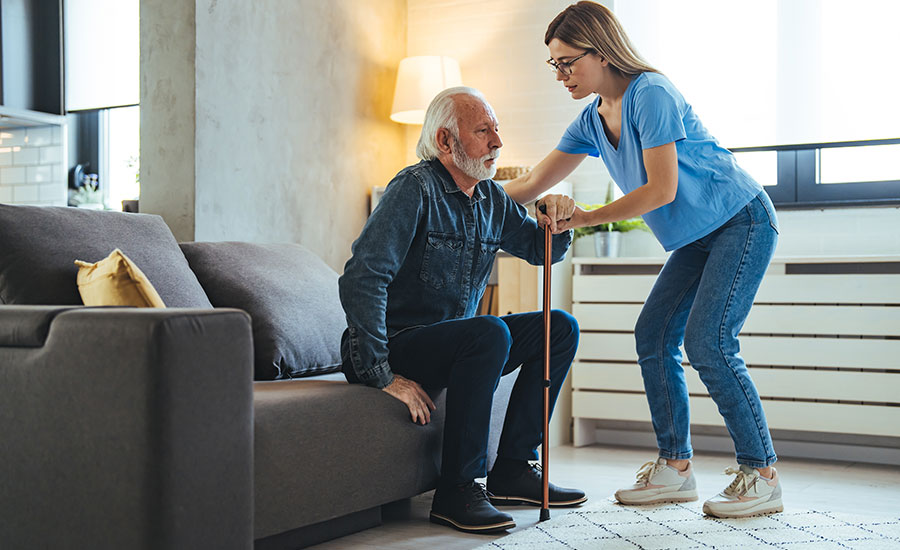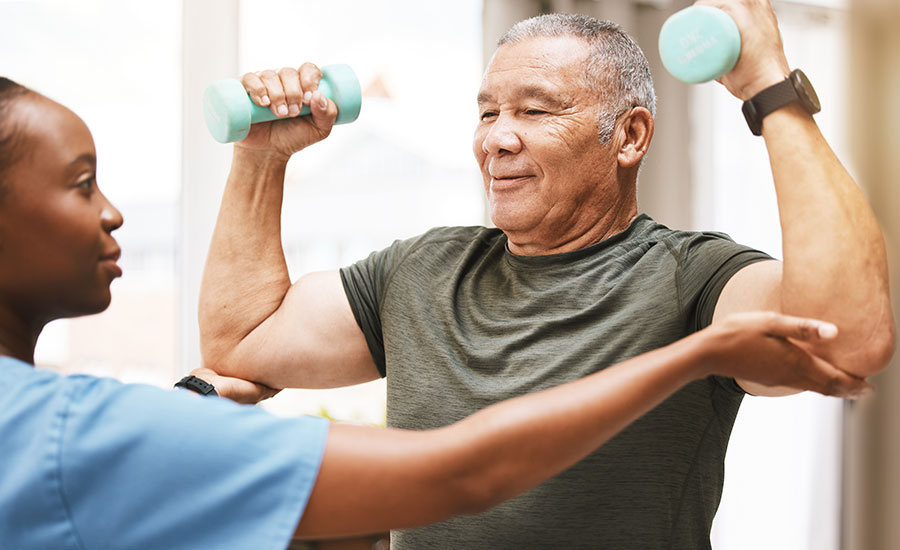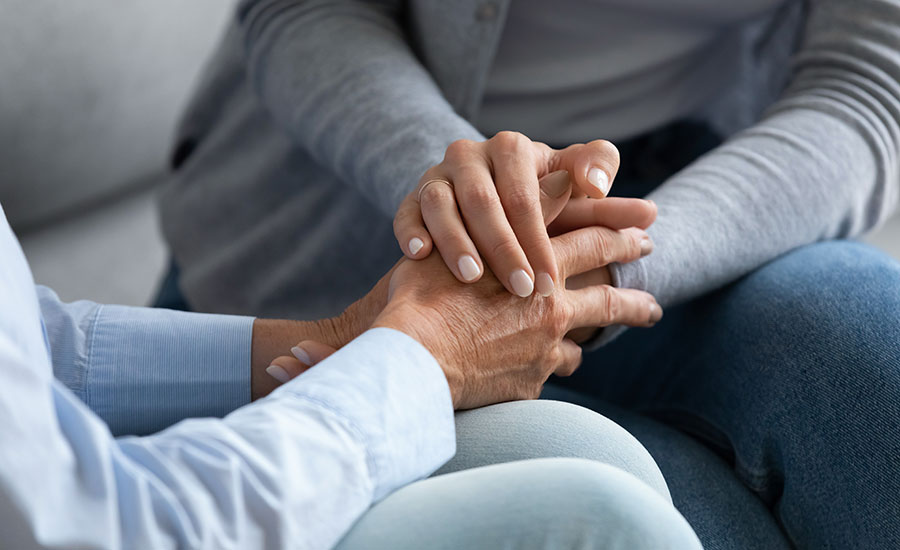How To Help an Elderly Loved One Recover After a Fall

While some falls might lead to small bruises, others might cause broken bones or serious head injuries.
If your loved one recently suffered a fall, you might be thinking of methods on how to support their recovery and prevent future falls from occurring.
But how exactly can you help your elderly loved one recover after a fall?
We’ll share how long it takes for an elderly person to recover from a fall, how to help your senior loved one regain their strength post-fall, and how the services at Always Best Care can help with recovery.
Table of Contents
Symptoms To Look for After an Elderly Fall
As your loved one’s caregiver, checking for any signs after an elderly fall can help you make sure that any complications or hidden injuries are quickly identified and addressed.
Common symptoms to look for after an elderly fall include:
- Visible injuries: Keep an eye out for signs of injury such as cuts, bruises, or swelling — particularly in areas like the hips, arms, or head.
- Discomfort: Listen for complaints about pain or noticeable discomfort, which may indicate injuries like fractures, sprains, or bruises.
- Numbness or tingling in the hands and feet: Ask your loved one if they are experiencing any loss of sensation or unusual tingling, as these can be signs of nerve damage or circulatory issues resulting from the fall.
- Vision changes: Make sure you know about any changes in vision, which could be a result of a head injury.
- Increased weakness: Check for any signs of increased weakness — especially in the arms or legs, which might indicate a stroke or other serious condition.
- Inability to move: Watch for any new or worsening difficulty when walking, standing, or moving around, as this can be a sign of a physical injury or fear of falling again.
- Behavioral changes: Look for changes in mental state such as aggression or irritability, which could be a result of a head injury.
- Headache or dizziness: Pay attention to complaints about headaches, dizziness, or nausea, which can suggest a concussion or other head injury.
- Loss of consciousness: Note if your elderly loved one lost consciousness during the fall, as this can indicate a more serious injury such as a concussion.
- Chest pain or shortness of breath: Pay attention to symptoms like chest pain or shortness of breath, which can indicate a traumatic injury such as broken ribs or a heart attack.
4 Treatment Plans for Recovery After an Elderly Fall
Your elderly loved one should seek care after a fall if there are any signs of serious injury, such as severe pain, tenderness, or loss of consciousness.
Even if there are no evident symptoms following a fall, talk to their healthcare provider, as some injuries, like internal bleeding, can worsen over time.
Treatment plans for recovery after an elderly fall include:
1. A Medical Evaluation
Encourage your elderly loved one to undergo a post-fall clinical assessment.
A post-fall assessment will evaluate their overall health to identify any complications and determine the underlying causes of the fall.
This evaluation includes a mobility and balance assessment, a medication review, and a check for injuries such as lacerations, bruises or signs of tenderness.
2. Pain Management
Make sure a healthcare professional evaluates your loved one’s condition to rule out injuries such as fractures or internal injuries that may not be immediately evident.
Depending on the severity of the pain, ask your loved one’s physician if they can take over-the-counter pain relievers to help manage discomfort.
You can also apply ice on the affected area immediately after the fall to help reduce swelling and pain.
3. Physical Therapy and Rehabilitation
Physical therapy can help your loved one after a fall, as it can improve balance and restore strength.
Strengthening weakened muscles and performing balance exercises can also help reduce the risk of future falls.
A physical therapist might introduce exercises that mimic daily activities like walking up and down the stairs, to help them safely return to their daily routine.
4. Fall Risk Evaluation
A fall risk assessment identifies factors such as your loved one’s stride time, step length, gait, and balance to pinpoint vulnerable areas in their mobility. This type of assessment is usually conducted by a healthcare professional.
You can also ask Always Best Care about their Balance Tracking System, a computerized balance analysis tool that provides an objective, accurate, and reliable fall risk analysis.
Following the assessment, your loved one’s healthcare professional can determine whether there are any underlying neurological disorders, such as Parkinson’s disease, that directly contribute to an increased risk of falls.
How To Help an Elderly Loved One Recover After a Fall
From simply showing your support to encouraging visits to the doctor, there are many ways you can help an elderly loved one recover after a fall:
- Respond calmly: Approach the situation calmly to prevent additional stress or panic for your elderly loved one. Speak in a soothing tone and reassure them that help is available.
- Look for signs of injuries: Carefully check for any injuries they might have sustained, such as visible signs of pain, discomfort, or distress. Ask your loved one if they feel any tenderness or if they can move their limbs.
- Help your loved one stand up if they are not hurt: Help them into a sitting position and offer your arm or shoulder for support as they stand.
- Call for medical assistance: Call an ambulance if your loved one is unable to move.
- Make sure they get enough rest: Encourage your loved one to rest and not rush back into any activities, as the shock of a fall can be both physically and emotionally demanding.
- Encourage your loved one to drink water: Give them a glass of water to improve blood flow and reduce inflammation and swelling after the injury.
- Apply compression to the injury: Use a clean bandage to gently compress the elderly’s injured or swollen body parts. This can help reduce swelling and provide support.
- Elevate their limbs: Use cushions or pillows to support your loved one’s limbs, further reducing swelling and pain.
- Monitor your loved one’s condition: Keep a close eye on their condition over the next few hours and days. Look for signs of delayed pain, discomfort, or confusion, which can indicate a more serious injury like a traumatic brain injury.
- Schedule a medical appointment: Book an appointment to make sure there are no underlying injuries.
- Consider physical therapy: Consider arranging physical therapy for your loved one to strengthen their muscles and improve balance.
- Implement safety measures in their home: Follow a home safety checklist and modify your loved one’s environment to reduce recurrent falls. This can include installing grab bars in the bathroom, removing tripping hazards, and ensuring proper lighting throughout their home.
- Educate your loved one on fall prevention: Teach them about the best ways to prevent falls such as wearing non-slip shoes and using a cane or walker.
- Plan for ongoing support: Determine whether your elderly loved one needs additional support, such as hiring a caregiver or implementing a personal emergency response system (PERS).

How Long Does It Take for an Elderly Person To Recover From a Fall?
The recovery time for a fall depends on different factors, including how severe the fall was, the type of injuries the person obtained, and their general health.
If your loved one had a minor fall, like slipping on a wet floor, they might get better in a few days to a week.
However, if they had a more severe fall causing injuries like broken bones or head injuries, the recovery process might take longer. In addition, your loved one’s physician might require them to undergo physical therapy as part of a treatment plan, which can increase the time it takes to recover.

Find Reliable Elderly Care at Always Best Care Senior Services
For more than 25 years, our unwavering commitment to delivering top-notch care has established us as a leading provider of senior care across more than 225 territories in the United States and Canada.
At Always Best Care Senior Services, we offer the Balance Tracking System to evaluate your loved one’s stability, reducing the likelihood of future falls.
Other care services we offer include:
- In-home care services: We offer a wide range of in-home care services, from 24-hour care and companionship to light housekeeping, medication reminders, and mobility assistance.
- Skilled home health care services: We can create a customized home care plan tailored to your loved one’s unique needs, including pain management and nutrition education and support.
- Specialized home care services: We use advanced technology such as personal emergency response systems, balance tracking systems, and remote patient monitoring, to offer continuous support for your loved one’s health.
- Respite care services: We provide flexible short-term or extended care options, allowing you to handle other responsibilities knowing that your loved one is in good hands.
- Senior living referral services: We can assist you in finding the ideal senior living community that meets your loved one’s needs and preferences.
- Veterans assistance program: We assist veterans in obtaining financial aid for medical care, as a gesture of honoring their sacrifices and commitment to the country.
Our reliable team is committed to providing top-notch care and support for elderly individuals who are recovering after a fall.





